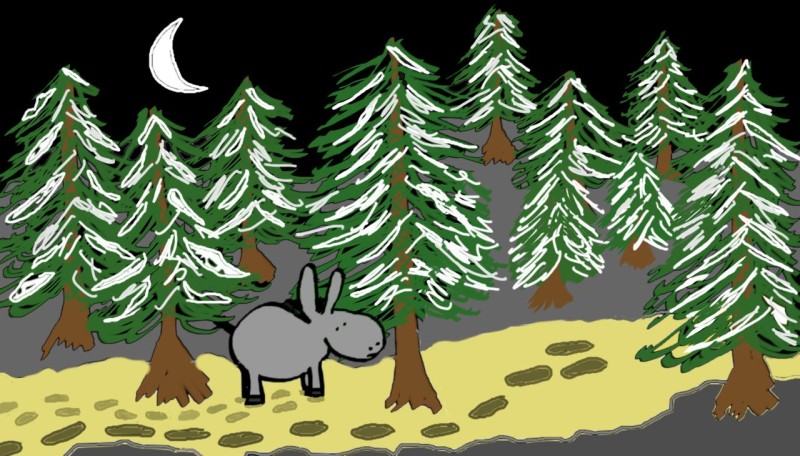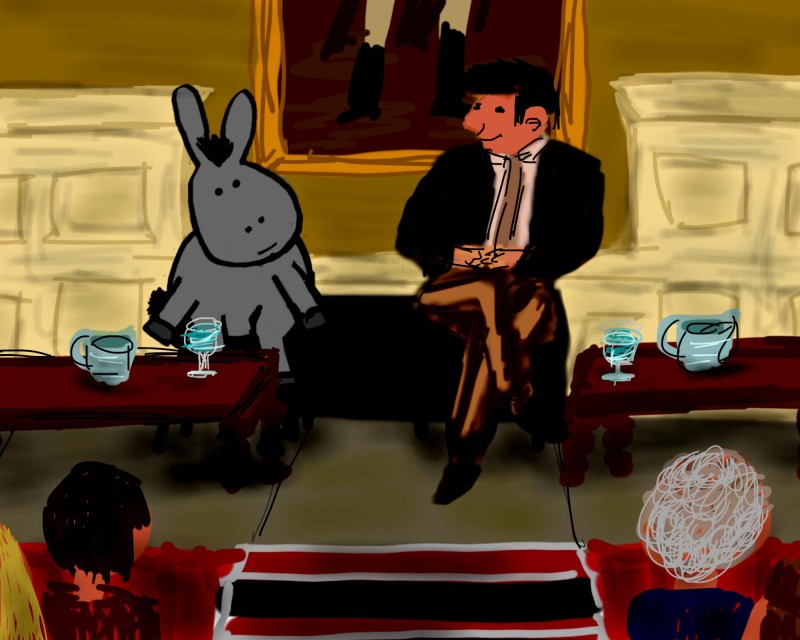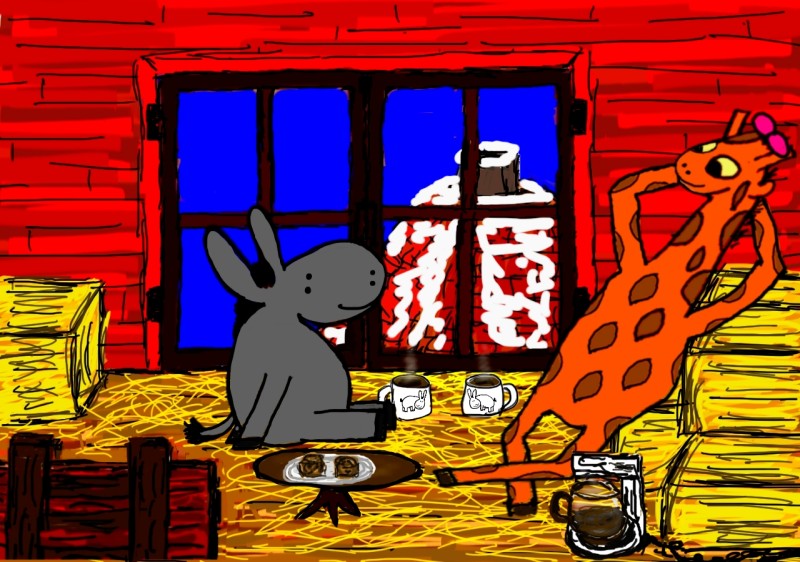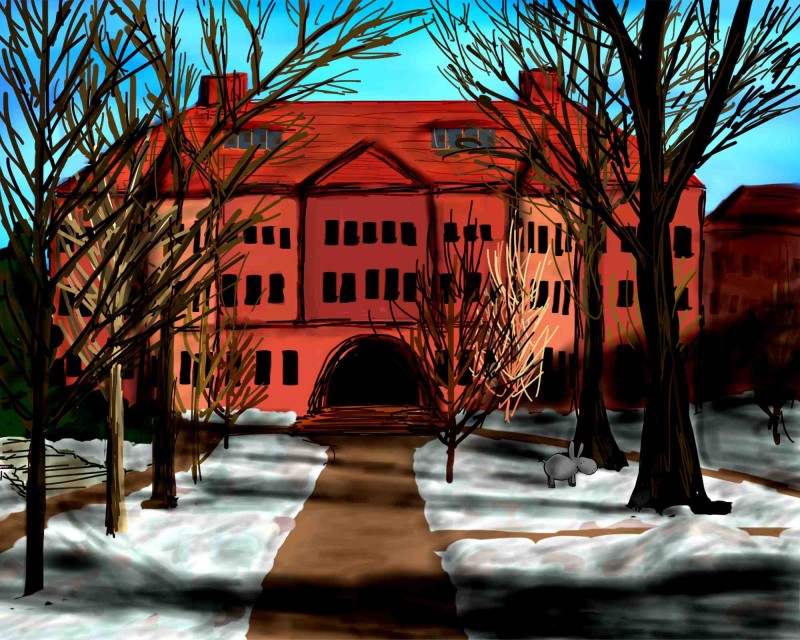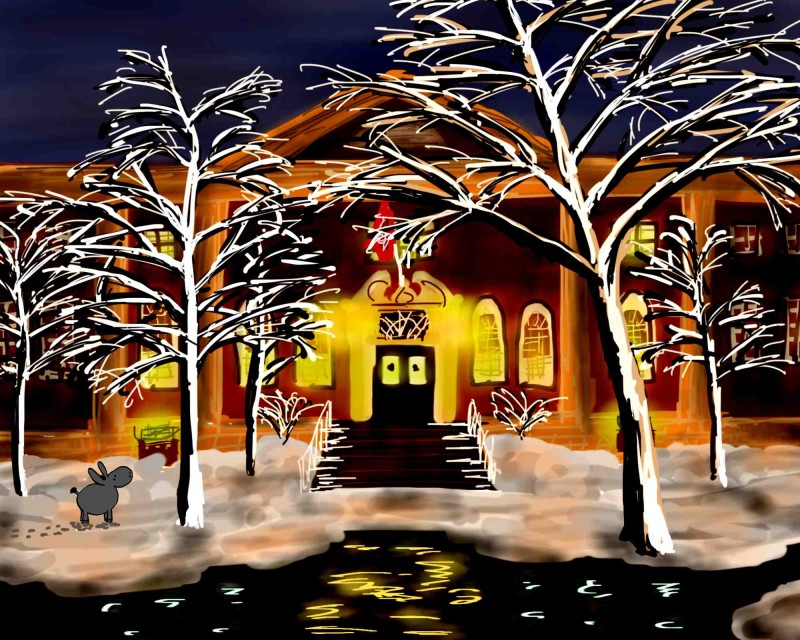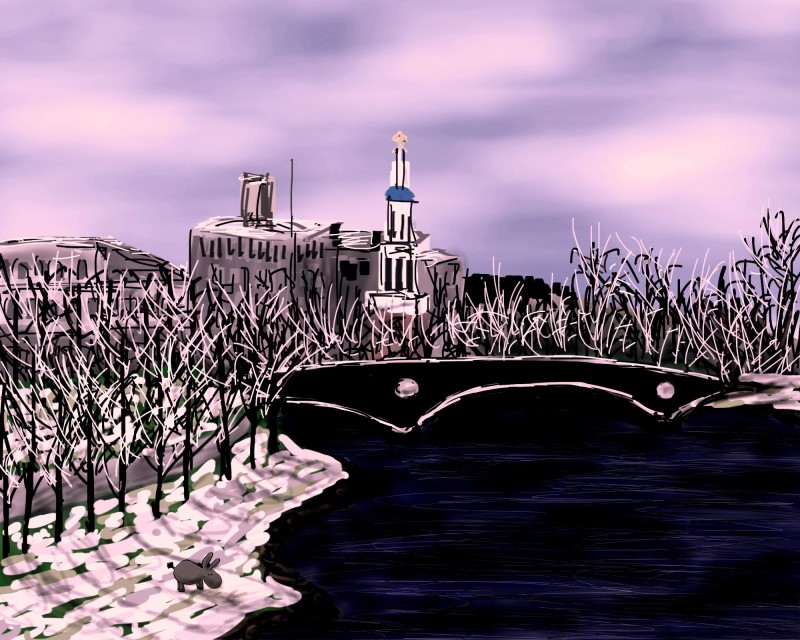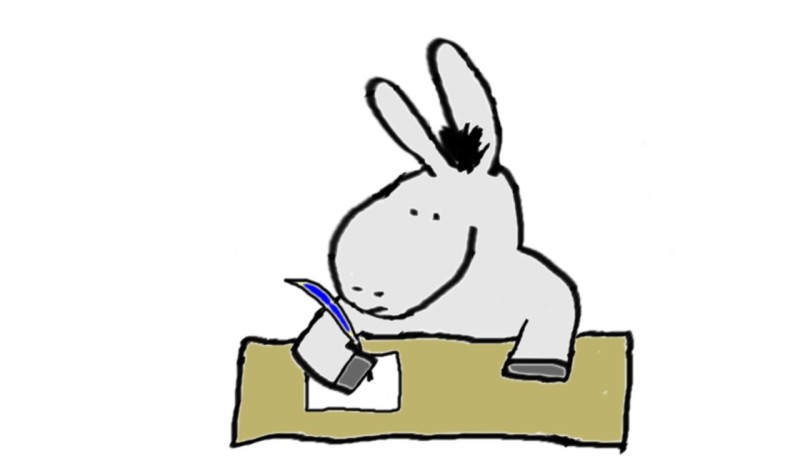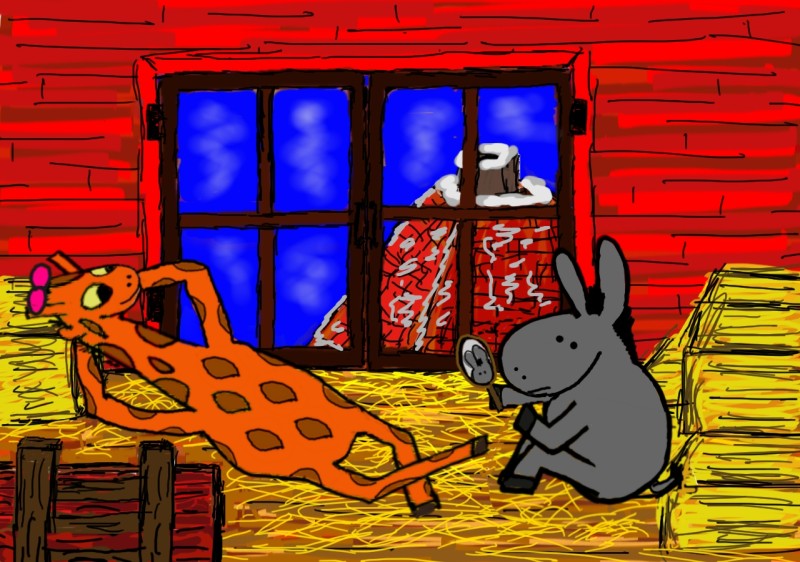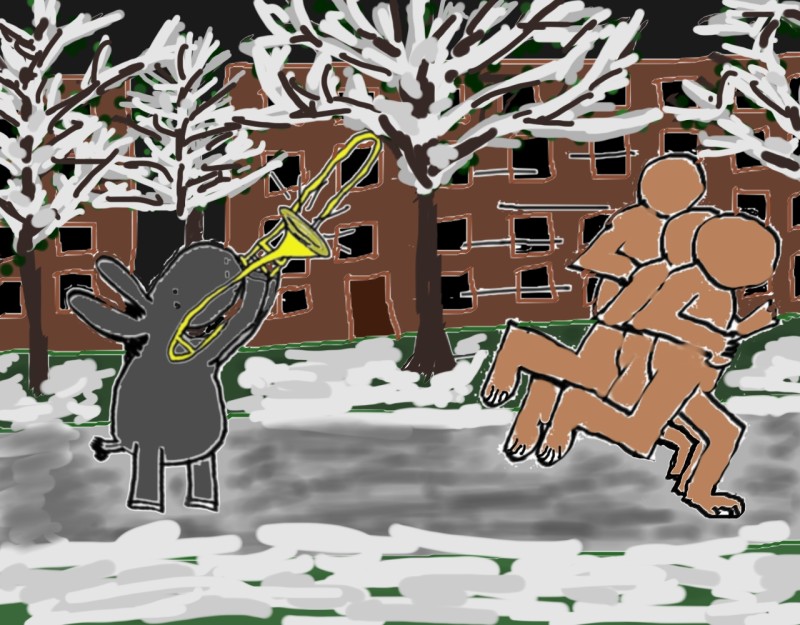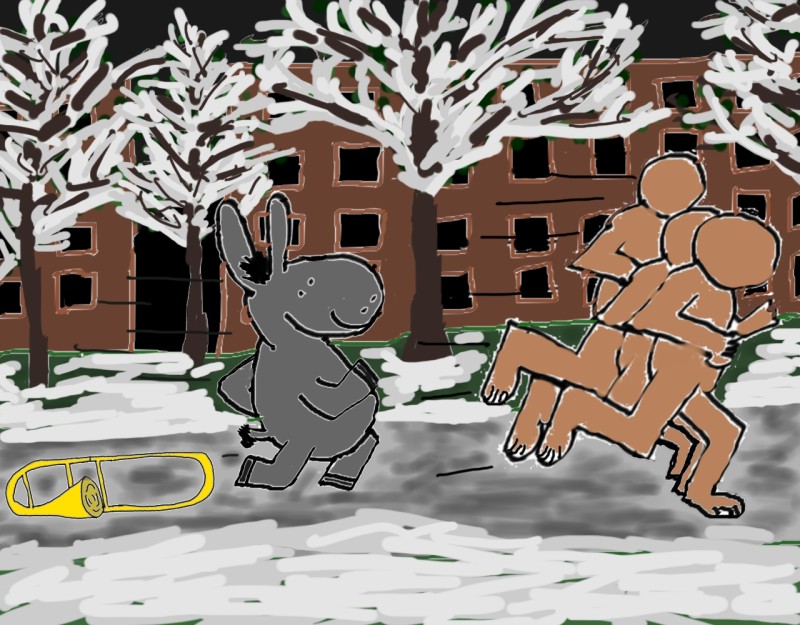Hey… footsteps in the snow. I wonder where they’re going? Maybe I’ll follow them. Doo dee doo dee dee, dee dee dee dee doo… hey, what’s this? No more footsteps. I wonder what happened to the person who was making them? How can a person just vanish like that, and make no more tracks? Hmmm, maybe I’d better go see Harlan, and make sure he’s alright.
Tag: drawings
“Blurtso stands in the snow” (V)
Welcome to tonight’s discussion sponsored by “The Campus Institute of Political Seriousness for Enhanced Living in an Unenhanced World.” I’m your host, Jonathan Wellborn Truington III, and joining us this evening is Mr. Blurtso Lundif, a third-year diversity fellow at Harvard College, who has garnered attention in Cambridge as, “the donkey who stands in the snow.” Please tell us, Mr. Lundif, if you would, what is your opinion of the current political climate in our nation’s capital? The political climate? said Blurtso. Yes, said Mr. Truington. I don’t know anything about it, said Blurtso. Do you think, said Mr. Truington, that the politicians should all go stand in the snow? It couldn’t hurt, said Blurtso. And what have you accomplished, said Mr. Truington, by standing in the snow? Accomplished? said Blurtso. Yes, said Mr. Truington, what have you learned? I’ve learned to stand still, said Blurtso. To stand still? said Mr. Truington. Yes, said Blurtso. Anything else? said Mr. Truington. Isn’t that enough? said Blurtso. Well, said Mr. Truington, I suppose it is… and where exactly do you stand? Anywhere, said Blurtso. Anywhere? said Mr. Truington. Yes, said Blurtso, anywhere that’s snowy and cold. Is there something, said Mr. Truington, that inspires you to do it? Yes, said Blurtso, it’s compelling to stand in a public place that is empty… and where, if someone does appear, they move so quickly they may as well not be there. I see! said Mr. Truington, standing in the snow is an indictment of the modern world and its frenetic pace! Is it? said Blurtso. Does it bother you, said Mr. Truington, if others stand in the snow next to you? No, said Blurtso, as long as they don’t ask questions. Questions? said Mr. Truington. Yes, said Blurtso, about why I’m standing in the snow. Of course, said Mr. Truington, and apart from your scathing attack on people in a hurry, what other statements are you trying to make? Are you attempting to draw attention to a charitable cause? Are you trying to see how long you can stand before collapsing? No, said Blurtso, I go home whenever I want. And how do you know, said Mr. Truington, that it’s time to go home? As soon as I start walking, said Blurtso, I know it’s time to go. Remarkable, said Mr. Truington. Well, ladies and gentlemen, there you have it, neither ice, nor sleet, nor snow will stop this remarkable coed from making his stand. Please join us next week when our featured speaker will be Somerville’s own self-deprecating playwright and hairbrush salesman, Reverend Willy J. Loman.
“Blurtso stands in the snow” (IV)
“Blurtso stands in the snow” (III)
“Blurtso stands in the snow” (II)
“Blurtso stands in the snow” (I)
“Blurtso feels good about his art exam”
Final Exam – Art 101
Name: Blurtso
1.) Name three characteristics of ancient Greek and Roman sculpture:
Large noses, round bellies, and foreshortening of the limbs.
2.) Discuss the difference between Medieval and Renaissance art:
During the Renaissance donkeys rose to a new level of importance. There were praying donkeys in the cathedrals, reclining donkeys in the fountains, and braying donkeys in the streets. The greatest example of donkeycentrism is Michelangelo’s “The Blurtso.” Michelangelo also painted the Sistine Corral.
3.) What innovation was shared by both Impressionist and Expressionist
painters, and how was it used differently by the two groups?
Pumpkin pie. The Expressionists painted their canvases before eating pumpkin pie, and the Impressionists painted their canvases after.
4.) What is Cubism?
Cubism was a style of painting developed by Georges Braque and Pablo Picasso which portrayed objects as seen from all perspectives at once. Sort of like standing naked in a room of mirrors with half a newspaper and a broken guitar.
“Blurtso considers the ideal shape”
Do you think my ears are too big? said Blurtso. Too big for what? said Alex. You know, said Blurtso, too big, too big for the ideal shape of a donkey. I’m not sure, said Alex, what’s the ideal shape of a donkey? You know, said Blurtso, the shape you always see in the magazines, on the billboards, and in the beer commercials. Beer commercials? said Alex. Are those donkeys ideal donkeys? They must be, said Blurtso, or the advertisers wouldn’t use them. How do you know the advertisers aren’t using grotesque donkeys to get our attention? Grotesque donkeys? said Blurtso. I never thought of that… but if those shapes aren’t ideal, then what is? I don’t know, said Alex, maybe your shape is ideal. My shape? said Blurtso. Sure, said Alex, why not? Well, said Blurtso, it is a fine shape, and it has served me well… I guess it must be very sad… to be a grotesque, small-eared donkey, paraded around so the world can see.
“Blurtso feels good about his philosophy exam”
Final Exam – Philosophy 101
Name: Blurtso
1.) Describe the philosophy of Lao-Tzu:
Slow down, you’re already there.
2.) Explain the statement, “If there is no other, there is no I.”
Friends are important.
3.) What did Heraclitus say?
You can’t eat the same pumpkin pie twice.
4.) What lesson do we learn from Plato’s allegory of the cave?
It’s hard to see in the dark.
